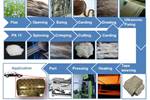DrapeCube offers cost-effective preforming process for FRP textile production
The DrapeCube offers a cost-effective design for the production of fiber preforms from textile semi-finished products.

Source | ITA of RWTH Aachen University
With the aim to provide cost-effective heating and forming of reinforced textiles for complex, 3D-shaped prototypes, as well as small production quantities, the (ITA, Aachen, Germany) is developing a forming station, termed the DrapeCube. Currently used by ITA for research purposes, the DrapeCube is said to avoid several high production costs associated with the preforming process, including the variance of component quality, increased component weight and other cost-intensive fluctuations associated with the manual manufacture of fiber-reinforced plastic (FRP) components. Further, compared to the solution of the stamp forming process used to shape textiles, the DrapeCube offers an alternative for smaller-scale production.
To heat the textiles, hot air is injected into the tool cavity from a pneumatic pressure pipe, and heated up to 200°C by an electric coil, thus applying heat to the textile in a controlled manner over a short period of time. According to ITA, this approach enables the thermoplastic adhesive material to be melted and cooled before, during or after shaping. Pneumatic cylinders are then used to generate the contact pressure. With a component projection area of 100 millimeters by 200 millimeters, contact pressure of up to 100 kPa can be achieved.
This post is courtesy of the ÂÌñÏ×ÆÞ and media partnership.
Related Content
-
Sulapac introduces Sulapac Flow 1.7 to replace PLA, ABS and PP in FDM, FGF
Available as filament and granules for extrusion, new wood composite matches properties yet is compostable, eliminates microplastics and reduces carbon footprint.
-
Revisiting the OceanGate Titan disaster
A year has passed since the tragic loss of the Titan submersible that claimed the lives of five people. What lessons have been learned from the disaster?
-
Plant tour: Airbus, Illescas, Spain
Airbus’ Illescas facility, featuring highly automated composites processes for the A350 lower wing cover and one-piece Section 19 fuselage barrels, works toward production ramp-ups and next-generation aircraft.



